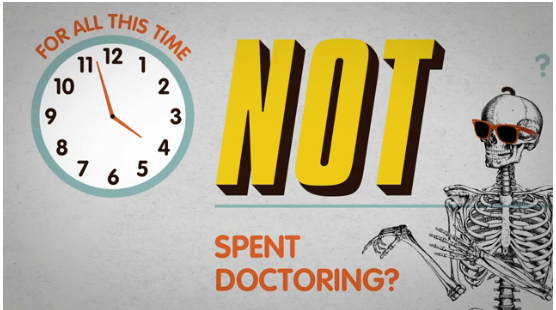In 2009, legislation mandated that doctors make use of electronic medical records by 2013 to help make the healthcare process run smoother and more efficiently. This information video (below) produced by HonestPancake explains the basics of the why and how. It’s also sort of an advertisement for GE Healthcare’s Centricity Advance.
[Thanks, Mike]


 Visualize This: The FlowingData Guide to Design, Visualization, and Statistics (2nd Edition)
Visualize This: The FlowingData Guide to Design, Visualization, and Statistics (2nd Edition)

too bad it gives a perfect description of the problem and 10 seconds describing briefly the “solution”.
@righini yeah… maybe there will be a part 2.
@flowingdata hope so, meanwhile check this awesome from @shanesnow : http://seo.9gag.com/gag/36810/ :-)
@righini hm, so farmville…isn’t real?
@flowingdata looking at the hours spent, apparently it’s more real than actual real farming.
@righini I sense a solution to world hunger.
@flowingdata indeed: let’s feed them with farmville’s fruits and crops.
@flowingdata what will come first? People understanding that farming their own garden could be fun, or configuring the real tractors to be driven wireless through the internet?
@righini hope for the former. wait for the latter.
It’s funny that I didn’t ready your whole intro, and then I was quite surprised that it was a plug for GE in the end. Seems kind of like a teaser for the “future of medical records”… maybe part 2 will come along.
Side note: have you seen the update to Google Health? (if you even knew it existed, I didn’t) Wonder if they’ll try to partner with something like this in the long run.
There are a lot of possibilities with EMR, a presentation from Tim O’Reilly’s Gov 2.0 Expo, http://thefuturewell.com/2010/06/05/gov-2-0-redesigning-health/ looks at some design considerations when designing something that will be used by everyone.
white elephant, anyone?
the problem with “denials” is not due to “errors” in forms, but due to deliberate insurance company strategies aimed at decreasing reimbursement rates
one company had been withholding payment for 9 months because some idiot clerk could not “justify” elbow surgery for a “radial neck” injury (which she told us she thought was a “neck problem”)
how about “too little time spent doctoring”… you think that time will be saved by entering multiple passwords each time a patient contact is initiated?
or how about having to enter icd-9 codes instead of actual medical diagnoses – talk about saving time with that one: the work that is usually done by a clerk now, in a computerized system of today’s vintage has to be done by the physician himself (before the medical chart can be signed and closed on the computer and the physician can get on with the rest of his day)
talk about “courier pigeons” is pure demagoguery: a phone call is enough to get information from a physician colleague on any pressing issues – and there is no substitute for physician to physician conversations; i can speak from experience when i say that obtaining patient records from other physicians is not a huge hassle and it most definitely does not justify investment in expensive proprietary unproven electronic record systems that don’t pay for themselves
and that is the bottomline, current emr systems are expensive, proprietary (so if the company goes out of business, you can’t read the patient charts that you have created), these systems are incompatible with each other, and they are worse than the problem they try to solve
the us government is wrong to try to push this issue, they should let physicians adopt useful technologies based on business reasons
for instance, PACS systems truly are useful, they do save time and material, and most physicians have adopted those without needing to be pushed, because such systems make business sense
Whew. Thank you. I’ve already been up way too late, and that got me all wound up; reading this was cathartic.
Just to clarify, I totally support the adoption of EMRs (in large part because it would make my life much easier). I would just prefer ones that don’t suck and haven’t been rushed in to use.